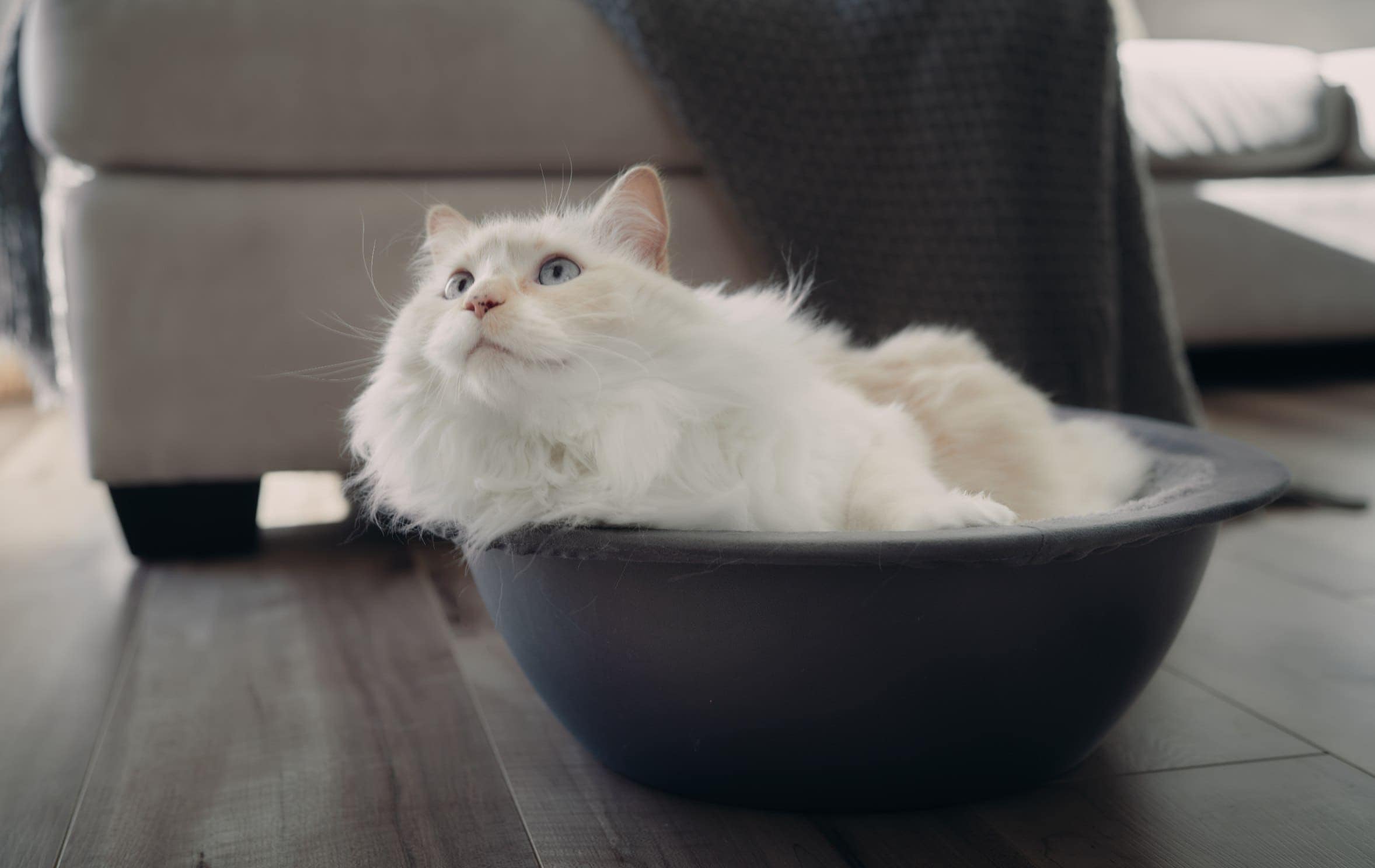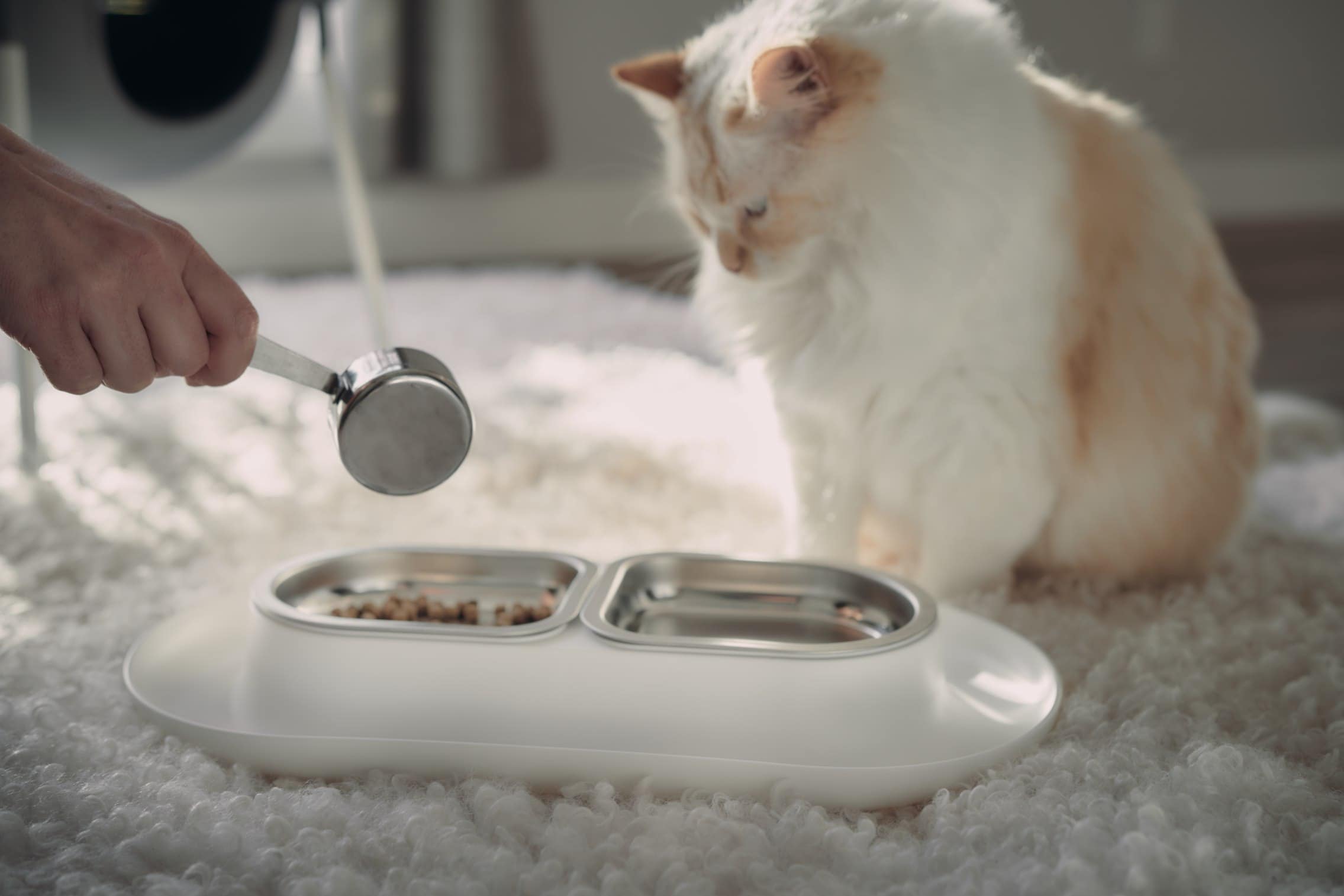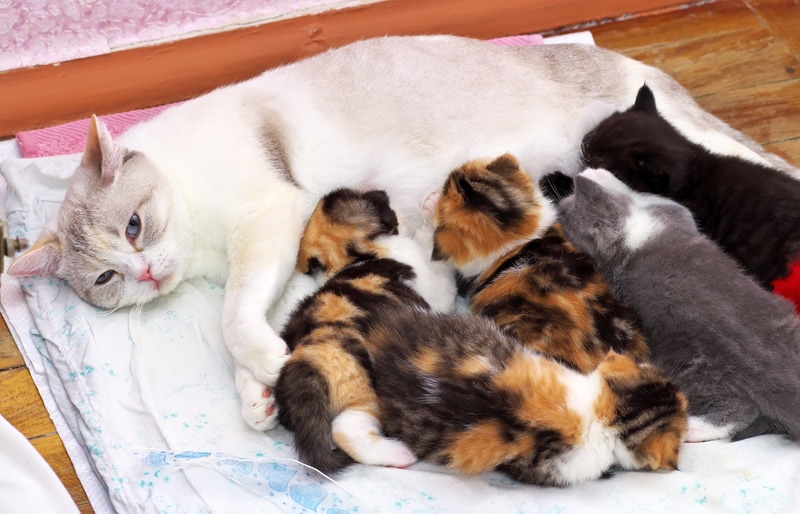Can a Hairball Kill a Cat? Risks & Prevention Explained

Updated on
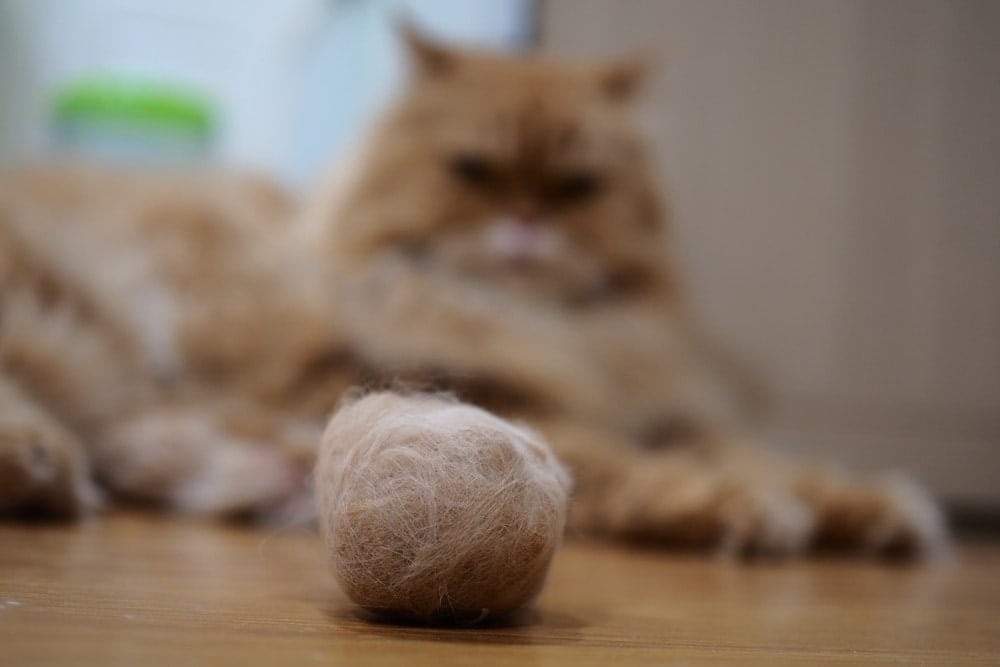
Click to Skip Ahead
A cat coughing on a hairball isn’t an irregular occurrence. Many longtime cat owners recognize the signs of hairballs pretty easily. Suddenly their cat begins coughing and even wheezing in some cases, then after a minute or two, up comes the hairball and all is well.
Though hairballs are as common to cats as ear scratching is to dogs, it can be easy to understand why it may cause concern–especially in kittens or mature cats. But can hairballs be fatal to cats? Short answer is, that it is very rare, but possible.
Can Hairballs Kill Cats?
It’s pretty rare for a hairball to kill a cat, but it is possible and there have been cases of this occurring. A hairball (aka “trichobezoar”) is essentially exactly what it sounds like. It’s a hard ball of matted hair that forms in the gastrointestinal tract of a cat. It occurs when cats swallow too much hair during their regular grooming process.
The hair accumulates in the stomach and eventually gets big enough to need to be removed up through the esophagus. A hairball can become dangerous to a cat if it either chokes on it while trying to regurgitate the hairball or if the hairball becomes lodged in its digestive tract and causes a blockage that isn’t treated.
Are Some Cat Breeds More Prone to Getting Hairballs?
Yes. Hairballs are more common in long-haired cats including the Siberian, Selkirk Rex, Persian, and Himalayan breeds. Though hairballs can definitely occur and short-haired cats, they are typically less common because of the reduced amount of grooming required.
Because cats shed their winter coats more frequently in warmer weather, hairballs are more likely to occur in especially hairy felines. Hairballs are also more common in cats that groom more frequently than others–something that may be specific to each cat.
Hair should be ingested and then pass along the digestive tract and be passed out in feces. If cats are suffering regularly with hairballs there could be a medical reason for this, so get them checked out at the vet.
The 3 Tips To Prevent Cat Hairballs
1. Grooming
Regular brushing is perhaps the best way to reduce the amount of hair that your cat ingests through self-grooming. The less your cat has to groom itself, the better. And note that grooming can also help you bond with your feline friend. But if your cat is resistant to brushing, you can take it to the vet or to a trusted groomer once or 4 times per year (or more often if needed).
2. A Healthy Diet
A cat diet that lacks proper nutrition can lead to many health problems, including vomiting hairballs. Indigestible and inflammatory ingredients are not good for a cat’s digestive system and can lead to hairballs developing more easily. This is also why many veterinarians recommend raw cat food.
Raw cat food can be a great way to reduce hairballs naturally and increase water intake. Here are a few raw food options that can help revive your cat with the daily vitamins, minerals, and omega fatty acids that it needs to stay healthy and minimize shedding.
3. Additional Skin & Coat Supplements
To prevent hairballs, you can also add certain supplements to your cat’s day to improve their digestion and skin health
Digestive Enzymes
Digestive enzymes are great for helping cats break down solid foods or those high in protein. These enzymes will also help break down hairballs, minimizing their frequency. Digestive enzymes are also often coupled with omega fatty acids, essential vitamins, and minerals that help to promote healthy skin and coat and soothe upset stomachs.
Goat Milk
Goat milk has grown in popularity over the last few decades as a great alternative to cow milk. It is lower in lactose and rich in enzymes. It can also add moisture to your cat’s diet.
There are also goat milk cat products that are infused with probiotics (such as The Honest Kitchen Instant Goat’s Milk) to help support a healthy immune system. Overall, goat milk can aid in preventing hairballs by keeping your cat’s skin and hair healthy.
Marshmallow Root
Marshmallow root is another product that can help soothe your cat’s digestive system and prevent hairball irritation. It can be purchased in tablets or as a liquid herbal tincture. Often, marshmallow root has a slippery effect and soothes mucous membranes.
Hairballs can easily irritate a cat’s stomach and digestive tract. In turn, this could lead to inflammation in the digestive tract. Marshmallow root tincture can reduce inflammation and help move hairballs through the system.
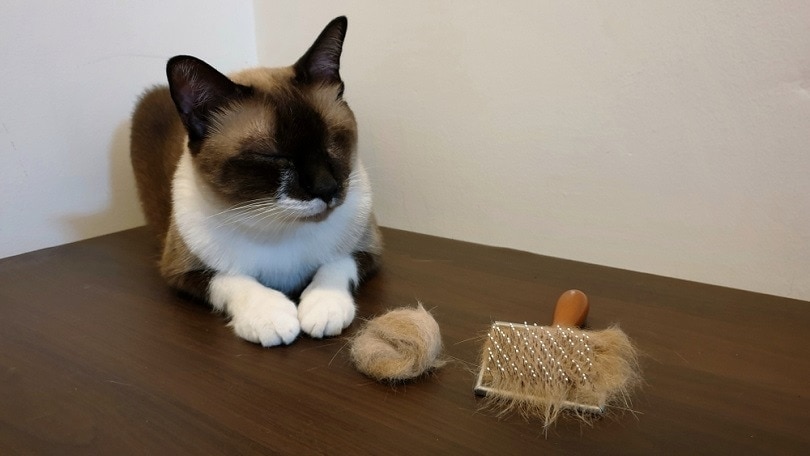
The 4 Reasons a Cat Is Coughing or Wheezing
If you find your cat wheezing or coughing, the issue may not be a hairball, it may be something else. Sometimes, your cat might cough up food or small half-eaten treats. Inhaling polluted air, cigarette smoke or other harmful chemicals can also trigger coughing fits. However, if there is a wet cough or mucus, be extra vigilant in finding the culprit. Here are a few common ones.
1. Windpipe Blockage from Food
Many things can put pressure on your pet’s airways. Coughing can be caused by overly tight collars. Or your feline buddy may have asthma or be prone to it. This can lead to respiratory problems like wheezing and coughing.
It’s not uncommon for cats to pick up hairballs from the floor, especially if they are bored and looking for a random toy to play with them–yes, many cats regard hairballs as new play toys. However, you shouldn’t allow hairballs to accumulate on your floors.
Vacuuming your home regularly and brushing your cat with a slicker every day (or every other day) are the best ways to reduce the risk of hairballs.
2. Indigestion
And sometimes the cat may simply have indigestion. Coughing can be caused by large amounts of cat food that come up from the stomach. Some cats will eat only small amounts of food, while others may eat large quantities at once–but can cause indigestion at some point.
Sometimes indigestion will cause a cat to vomit, but this is usually not an alarming scenario. However, if it happens often (as in more than 4 a month), you may want to take the cat to the vet.
3. Allergies
Similar to humans, cats can suffer from allergy problems just like we do. Factors such as cigarette smoke, grooming products, cleaning products, mold, and chemical fumes can all trigger allergies in cats. However, sometimes it can be difficult to nail down the culprit of the allergy, and a phased-out approach may be best.
4. Diseases
A variety of diseases can cause respiratory problems– which can also make cats more susceptible to hairballs. These diseases include throat inflammation, asthma, cancer, parasitic disease, and lung infections. If your cat has a regular occurrence of cat hairballs, it wouldn’t hurt to take it to the vet for proper diagnosis.
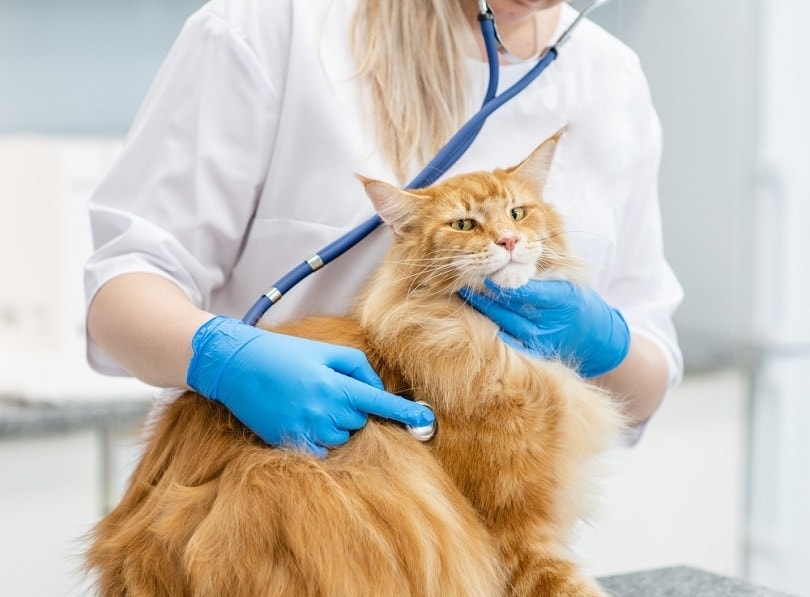
When to Take It to The Vet?
If your cat develops hairballs on a weekly basis, it’s a good idea to take it to the vet. Before you do, be sure to take some notes on when your cat develops the Hairball. For example, does it happen on a weekly or daily basis? Is it after the cat consumes a large meal? Is there mucus and the hairball? Does it produce a dry or wet cough?
These are the types of questions that your vet will likely ask to help determine the cause of the problem. There are many ways to treat cat hairballs and coughing. Your veterinarian may recommend medication, such as anti-parasite treatment, antibiotics, or corticosteroids.
Wrapping Things Up
To sum things up, cat hairballs are somewhat of a regular occurrence, and they rarely lead to fatalities in cats. However, if a cat develops hairballs on a regular basis, this can be a cause for concern and may be a sign of a more serious issue such as inflammation or digestive problems.
However, if your cat is coughing or wheezing, this may be due to other issues such as indigestion, windpipe blockage, asthma, or illness. If it becomes especially concerning, it is generally a good idea to take your cat to the vet for proper diagnosis and treatment.
See also:
- National Hairball Awareness Day: When & How You Can Celebrate
- Cat Hairballs: Causes, Prevention & Remedies
Featured Image Credit: Montakan Wannasri, Shutterstock

